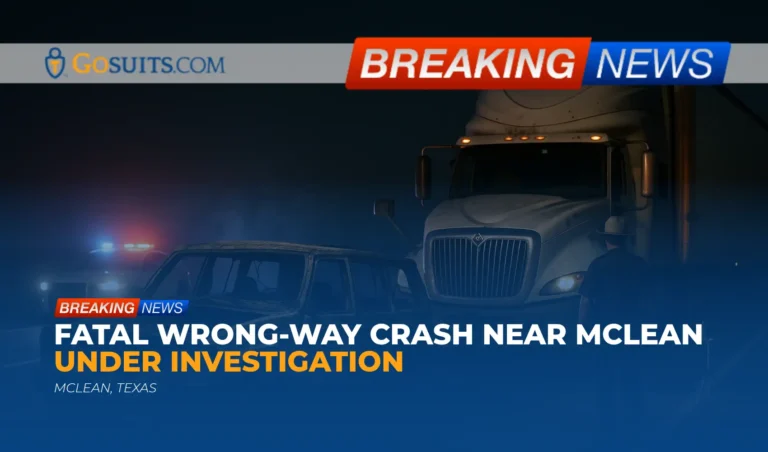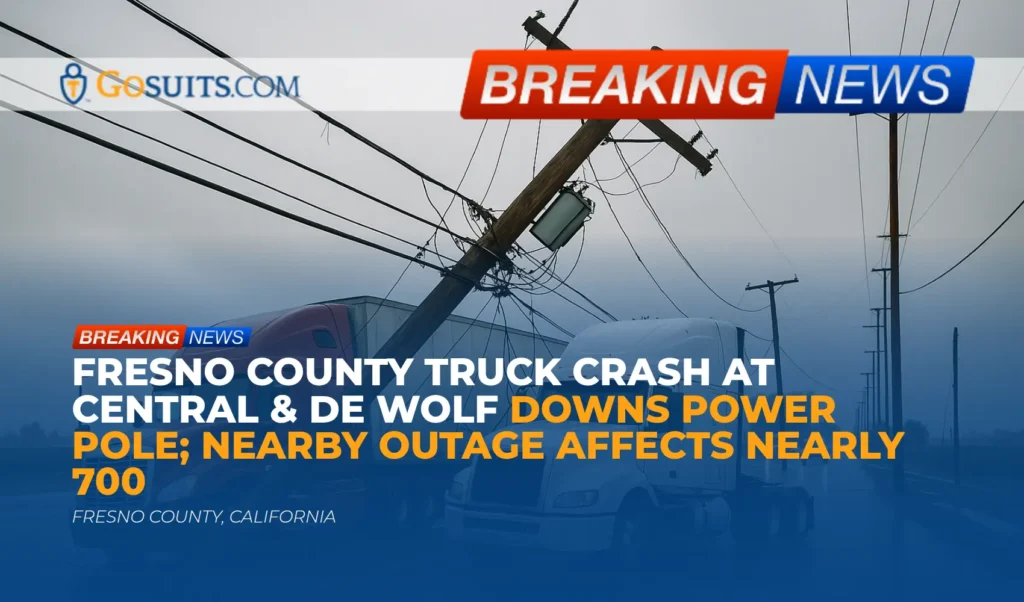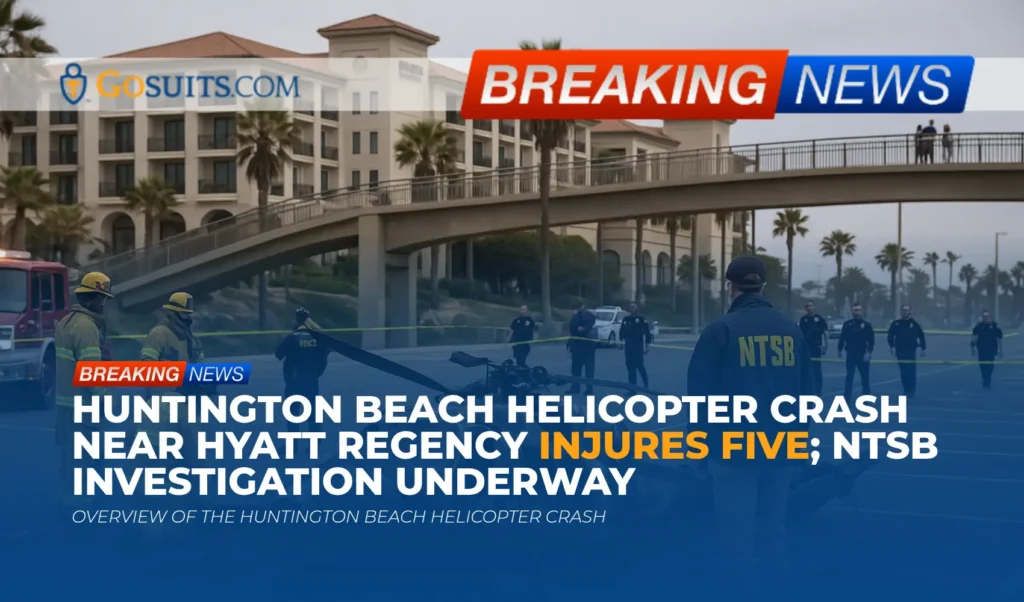A fatal head-on collision occurred early Monday morning on Interstate 40 near McLean, Texas, resulting in the death of one individual. The incident, which involved a passenger vehicle and a semi-truck, is under investigation by the Texas Department of Public Safety (DPS).
Incident Summary
According to DPS reports, the crash took place at approximately 1:17 a.m. on I-40, about two miles east of McLean. A 1991 Jeep Cherokee, driven by a 43-year-old man from Tyler, Texas, was traveling eastbound in the westbound lanes of the highway. The Jeep collided head-on with a 2021 International truck tractor towing a semi-trailer, which was traveling westbound.
The impact of the collision caused the Jeep to catch fire. The driver of the Jeep was pronounced dead at the scene. The semi-truck driver was transported to Shamrock General Hospital, where he received treatment for minor injuries and was later released.
Preliminary Investigation
The DPS is conducting a preliminary investigation to determine the factors that led to the crash. This includes examining the circumstances surrounding why the Jeep was traveling in the wrong direction on the interstate. Investigators will likely consider factors such as driver fatigue, impairment, and any possible distractions that may have contributed to the incident.
Legal and Safety Implications of Wrong-Way Accidents
Wrong-way collisions are often severe due to the high speeds typically involved and the element of surprise. These types of accidents can lead to significant injuries, fatalities, and substantial property damage. From a personal injury perspective, these incidents raise several critical legal and safety considerations.
Liability
In wrong-way collisions, determining liability is paramount. The driver traveling in the wrong direction is often presumed to be at fault. However, a thorough investigation is necessary to uncover all contributing factors. This investigation might involve:
- Review of Police Reports: Official police reports contain crucial details such as witness statements, accident scene diagrams, and preliminary findings regarding fault.
- Analysis of Vehicle Data: Event data recorders (EDRs), or “black boxes,” in both vehicles can provide valuable data on speed, braking, and other parameters leading up to the crash.
- Examination of Road Conditions: Investigators will assess whether road signage, lighting, and other environmental factors may have contributed to the incident.
- Witness Interviews: Gathering accounts from witnesses who observed the vehicles before the collision can help clarify the sequence of events.

Negligence
To establish liability in a personal injury claim, it must be demonstrated that the at-fault party acted negligently. Negligence refers to a failure to exercise reasonable care, resulting in harm to another person. In the context of a wrong-way accident, negligence might involve:
- Impaired Driving: Driving under the influence of alcohol or drugs significantly impairs judgment and reaction time, increasing the risk of wrong-way entry onto a highway.
- Distracted Driving: Engaging in activities such as texting, talking on the phone, or adjusting the vehicle’s navigation system can divert attention from the road, leading to navigational errors.
- Fatigued Driving: Operating a vehicle while excessively tired can impair cognitive function and decision-making abilities, increasing the likelihood of mistakes.
- Violation of Traffic Laws: Disregarding traffic signs, signals, and lane markings can result in wrong-way entry onto a highway.
Insurance Coverage
Following a wrong-way collision, multiple insurance policies may come into play. These include:
- Liability Coverage: The at-fault driver’s liability insurance policy is typically the primary source of compensation for injuries and damages suffered by the other parties involved.
- Uninsured/Underinsured Motorist Coverage: If the at-fault driver is uninsured or underinsured, the injured party may be able to recover compensation from their own uninsured/underinsured motorist coverage.
- Workers’ Compensation: If the semi-truck driver was on duty at the time of the crash, they may be eligible for workers’ compensation benefits to cover medical expenses and lost wages.
Damages
In a personal injury claim stemming from a wrong-way accident, injured parties may be entitled to recover various types of damages, including:
- Medical Expenses: Compensation for past and future medical bills, including hospital stays, surgeries, rehabilitation, and medication.
- Lost Wages: Reimbursement for lost income due to time off work for medical treatment and recovery.
- Pain and Suffering: Compensation for physical pain, emotional distress, and mental anguish caused by the injuries.
- Property Damage: Reimbursement for the cost of repairing or replacing damaged vehicles and other personal property.
- Wrongful Death: In cases where a person is killed in a wrong-way accident, their surviving family members may be able to file a wrongful death claim to recover damages such as funeral expenses, loss of companionship, and loss of financial support.
Safety Recommendations
To mitigate the risk of wrong-way accidents, drivers should:
- Pay Close Attention to Signage: Obey all traffic signs, signals, and lane markings.
- Avoid Impaired Driving: Never drive under the influence of alcohol or drugs.
- Stay Alert: Avoid distractions while driving and take regular breaks to prevent fatigue.
- Use Caution at Intersections: Exercise extra caution when entering or exiting highways, particularly at night or in adverse weather conditions.
- Report Erratic Driving: If you observe a vehicle traveling in the wrong direction, report it to law enforcement immediately.

Commentary from Gosuits Gray County, Texas Personal Injury Attorney
This tragic incident underscores the devastating consequences of wrong-way collisions. The complexities involved in determining liability and navigating the insurance claims process can be overwhelming for those affected. If you or a loved one has been injured in a motor vehicle accident, it is essential to seek the advice of a seasoned personal injury attorney who can protect your rights and help you pursue the compensation you deserve. A skilled attorney can investigate the accident, gather evidence, negotiate with insurance companies, and, if necessary, litigate your case in court. The goal is to alleviate the stress and burden of the legal process, allowing you to focus on healing and recovery.






